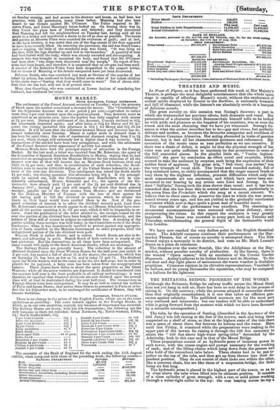THEATRES AND MUSIC.
Le Norm di Figaro, as it has been performed this week at Her Majesty's Theatre, is perhaps the most delightful entertainment that the whole opera stage is capable of affording. Mozart's music, without the exuberance of animal spirits displayed by Rossini in the Barbiere, is eminently dramatic and full of character, while the listener's ear absolutely revels in a banquet of delicious sounds.
The great novelty on this occasion was Sontag's Susanna; a part is which she transcended her previous efforts, both dramatic and vocal. Her personation of a character which Beaumarchais himself tells us he looked on with pride and pleasure as the happiest of his creations, was at once the truest and the most charming that we have yet witnessed. Sontag's Su- sanna is what the author describes her to be—gay and rieuse, but perfectly delicate and modest, as becomes the favourite companion and confidant of the virtuous Countess Almaviva. Her acting abounded in traits of genuine humour, but it had all her characteristic quietness and refinement. Her execution of the music came as near perfection as we can conceive. If there was a shade of defect, it might be that the physical strength of her voice was not quite sufficient to maintain its due prominence in some of the full concerted pieces. In the playful little air, " Venite, inginoc- chiatevi," she gave its conclusion SG effect novel and exquisite, which seemed to take the audience by surprise, such being the expression of their sudden burst of applause. The great aria, "Deli vieni, non tardar," was the very triumph of vocal skill. The broad and rounded melody, full of long sustained notes, so richly accompanied that the singer cannot break or vary them by the slightest inflection, presents difficulties which only the most consummate art can surmount, and which have never been sur- mounted in our hearing by any artists save Lind and Sontag. In the duet " Sull'aria," Sontag took the time slower than usual; and it has been remarked that she has done this in several other instances, particularly in the scena from the FreischtiM which she sang at a recent concert. We believe that in these cases she preserves the time to which she was accus- tomed twenty years ago, and has not yielded to the gradually accelerated movement which now-a-days spoils a great deal of beautiful music. The ensemble of the performance was excellent. The charming in- strumental accompaniments were executed with great delicacy, never overpowering the voices. In this respect the orchestra is very greatly improved. The house was crowded in every part both on Tuesday and Thursday, notwithstanding the general flight of the fashionable world from London.


























 Previous page
Previous page